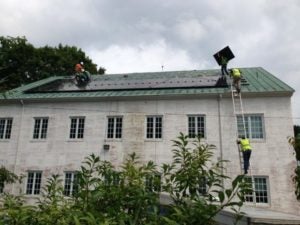Group trains future solar installers

Building West Virginia’s solar community can only go so far without installers trained to install panels. The Huntington-based Coalfield Development Corporation (CDC) is training people to meet this need. Its first class of a half-a-dozen solar installers began training late last year.
When the organization started in 2010, its goal was to provide affordable, quality housing to low-income families. Its founders soon realized that this would not be enough to meet the deep poverty challenges facing the community.
“If we want to improve our economy we’re going to need new businesses and new jobs, and we’ll have to do it ourselves,” said CDC Executive Director Brandon Dennison.
So, Dennison and the organization shifted gears. They began a job-training program focused on the construction industry. Their training program uses what they call the 33-6-3 model. Job trainees spend 33 hours per week involved in hands-on work. Six hours are spent toward earning an Associate’s Degree. In last three, trainees are taught important life skills such as financial management and physical health. Trainees are paid a wage throughout their studies and training. CDC works with trainees to place them in jobs once their apprenticeship is complete.
“What’s different about this program is that it isn’t just one off,” said Dan Conant of Solar Holler. Once the solar trainees have completed their program they will go to work for Conant’s company, installing panels as part of their two-year contract.
Conant said the idea of a solar training program developed in 2014 as increasing demand for solar in West Virginia outstripped the supply of installers. “Initially solar was going to be just one of our services,” Dennison said. “That we’ve had to spin it off, speaks well for the market and shows solar’s potential.”
To meet the training needs for future installers, CDC built a sophisticated facility at its headquarters. This allows the organization to provide intensive training. Installers who go through the program receive NABCEP certification. This is a valuable certification for solar installers to have, as it is a mark of the installer’s knowledge and abilities.
The entire training and apprenticeship is two and a half years long. Dennison said the next class of trainees should start in the next six months.
